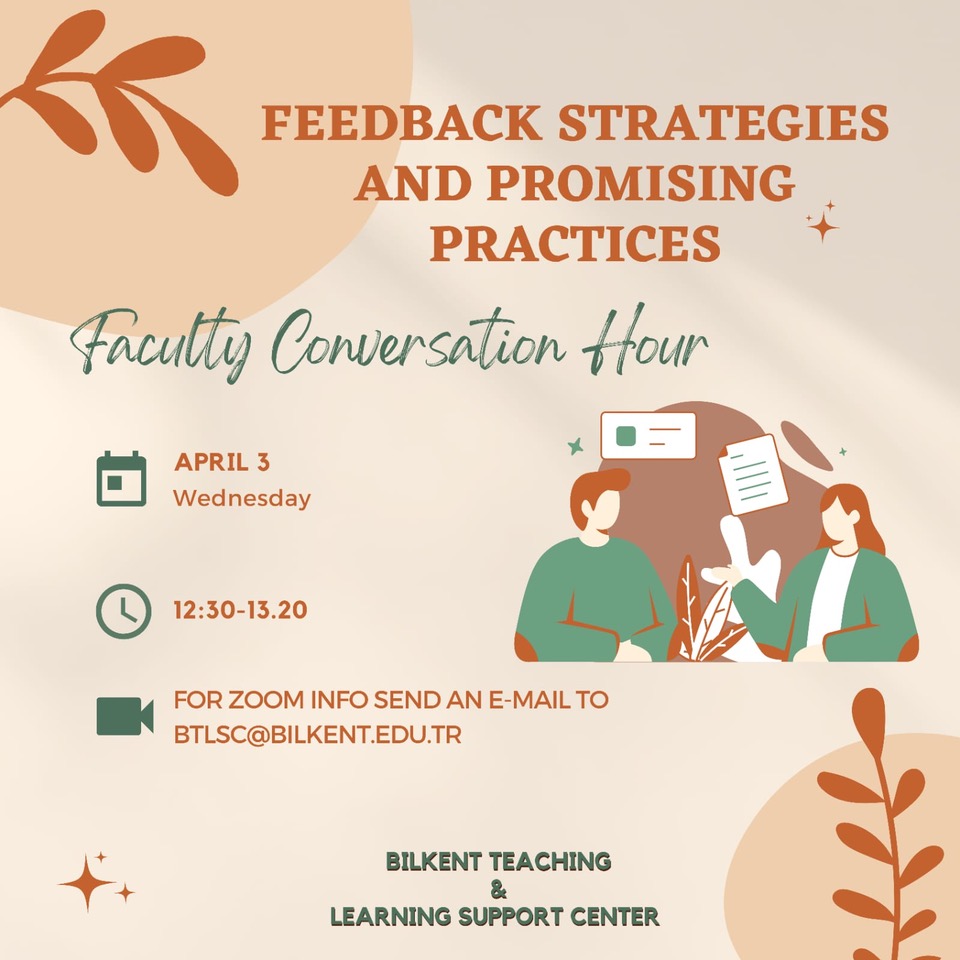Faculty Conversation Hour: Feedback strategies and promising practices
Date and Time: April 3, 12:30-13:20 via Zoom
Feedback serves as a compass in the journey of learning, providing learners with essential guidance and direction. Effective feedback offers specific information about what was done well and what areas need improvement, ultimately empowering learners to take ownership of their learning journey. Whether delivered verbally, in writing, or through other means, feedback plays a crucial role in promoting student engagement, motivation, and growth. During this hour, participants will share effective strategies used to give students feedback and to encourage them to respond to your feedback. Likewise, we can discuss challenges regarding feedback and share ideas for addressing them.
Send an e-mail to btlsc@bilkent.edu.tr for the Zoom information.
Workshop: Encouraging Student-AI Collaboration
Date and Time: 21st of March from 9:30-12:30 in G160
Participants will practice redesigning assignments to foster effective student-AI partnerships. We will work on facilitating student use of AI to enhance the learning experience and prepare learners for a future where AI is an integral part of problem-solving and innovation.
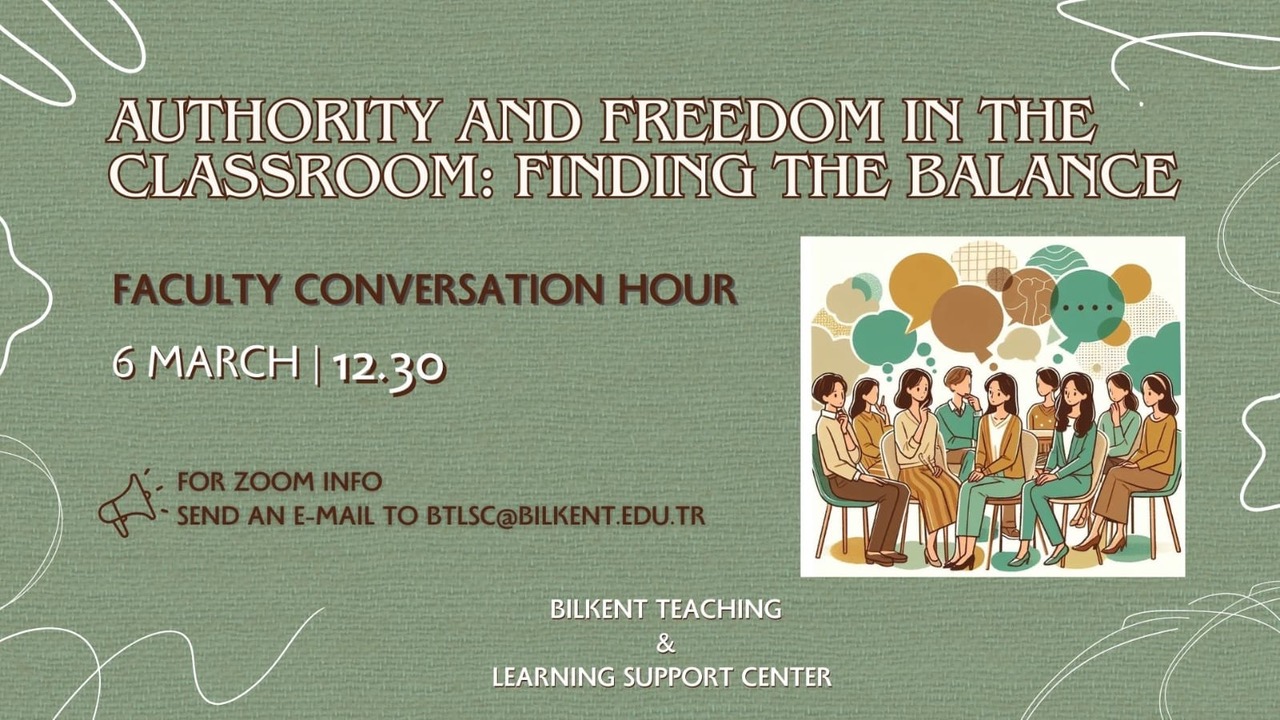 Authority and freedom in the classroom: Finding the Balance
Authority and freedom in the classroom: Finding the Balance
Date and Time: March 6,12:30-13:20 via Zoom
We will discuss some balancing issues regarding the limits of the authority of the instructor and the limits of the freedom of the students in the classroom. We will share our opinions on how to establish authority in the classroom, and to what end. We will talk about some promising practices and common mistakes.
Send an e-mail to btlsc@bilkent.edu.tr for the Zoom information.
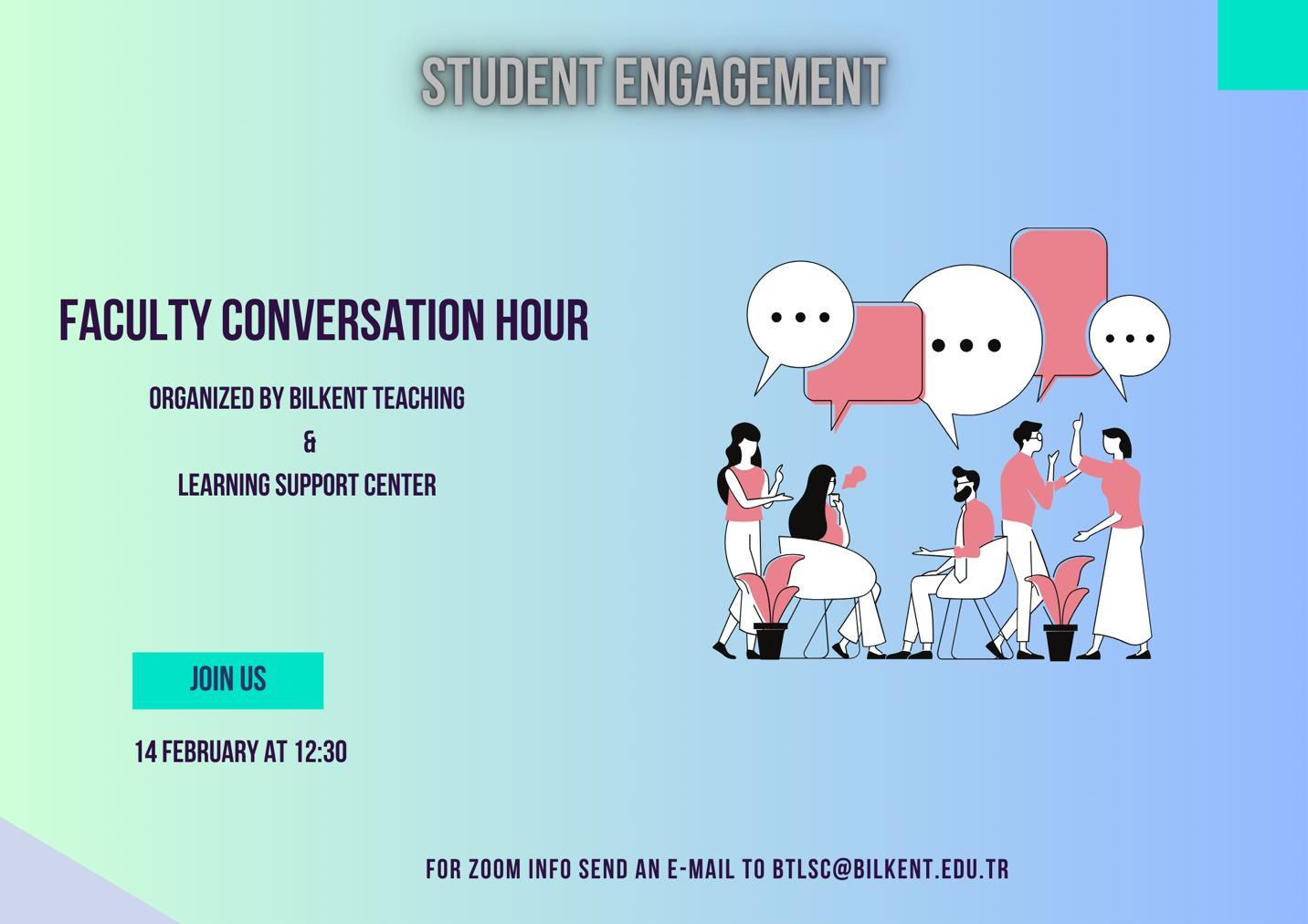 How to Actively Involve Students in their Learning
How to Actively Involve Students in their Learning
Date and Time: February 14,12:30-13:20 via Zoom
Let’s start the semester by sharing ideas and strategies to actively involve students in their learning. How do you engage students in your lessons? What challenges have you had motivating students?
Join us to share experiences and questions regarding student engagement.
For zoom information send us an e-mail: btlsc@bilkent.edu.tr
GenAI at Bilkent: Reflections on the Fall Semester
Date and Time: December 20, 12:30-13:20 via Zoom
We invite you to attend a conversation hour led by Prof Orhan Arıkan to share questions and comments about the use of GenAI in the Fall semester.
Send an e-mail to btlsc@bilkent.edu.tr for the Zoom information.
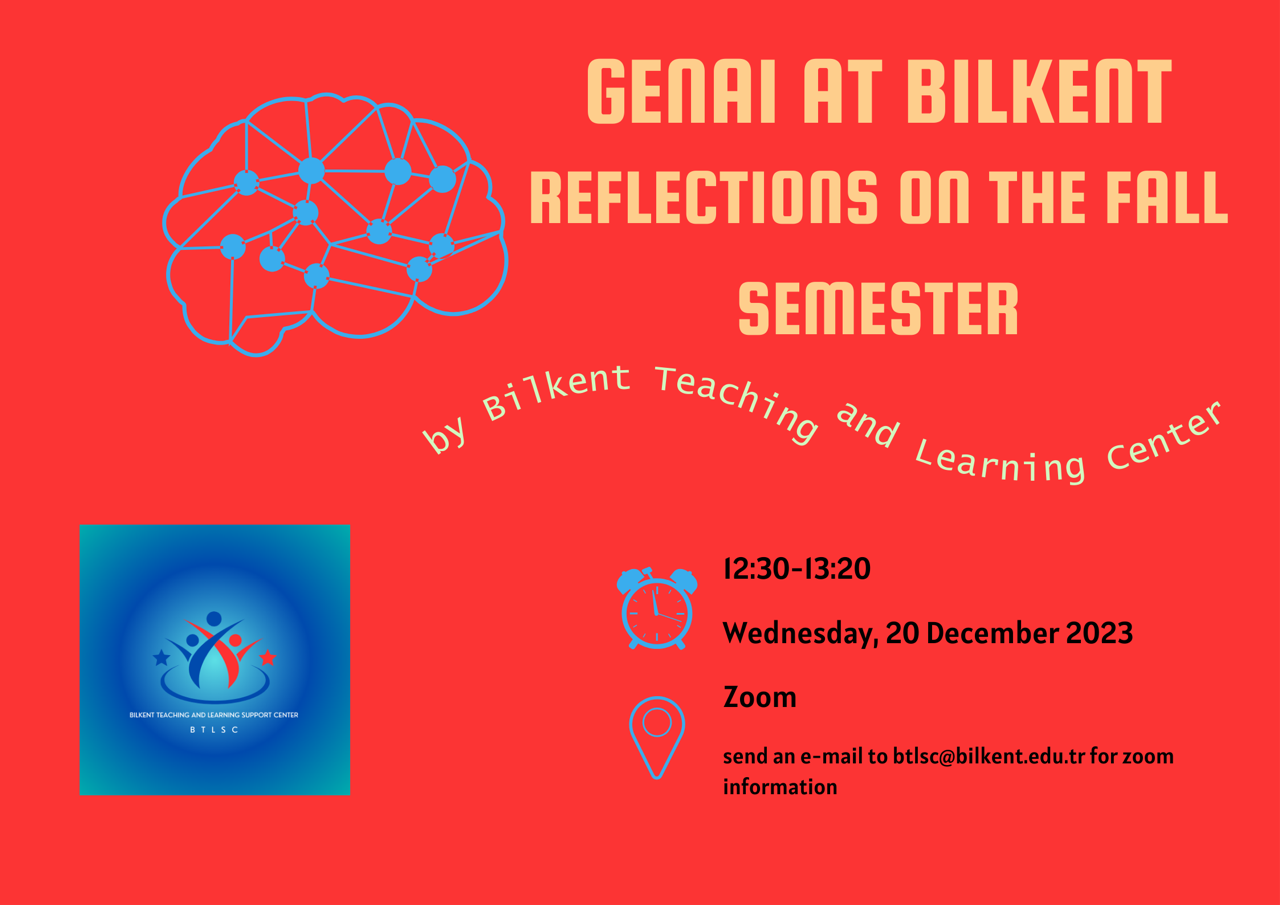
BTLSC Faculty Seminar: Enhancing Critical Thinking Skills in Education
We invite you to the forthcoming “Enhancing Critical Thinking Skills in Education” seminar. The seminar is scheduled for the 29th of November at 12:30 via Zoom (https://youtu.be/CZwboY6u55w).
Speakers:
Tufan Kıymaz, Department of Philosophy & BTLSC
Elif Çalışırer Günaydın, Özel Bilkent High School
This seminar serves as a platform to look into effective methodologies, drawing from the experience in high school education.
Seminar Focus:
– Critical thinking and what it means in higher education
– Bridging educational levels: Adapting successful high school practices to higher education
Elif Çalışırer Günaydın began her academic journey by completing her B.A. degree in the Department of American Culture and Literature at Hacettepe University and pursued a non-thesis master’s degree in the Faculty of Education English Language Teaching at Hacettepe University. She took the courses Contemporary Approaches to English Language Teaching and Neurolinguistic Programming in English Language Teaching at Gazi University as a master’s student, as well. Throughout her career, she has had various teaching and administrative roles, contributing to developing curriculum design, delivery, and pedagogical practices. She is currently working as the International Baccalaureate Diploma Programme (IB DP) Coordinator at I.D.F. Bilkent High School. She teaches IB DP Theory of Knowledge (TOK) and English A Language and Literature, Middle Years Programme(MYP) English Language and Literature courses. She edited and wrote an article named ” A Model for Effective EAP Outcomes: The International Baccalaureate Diploma Experience” with a focus on providing insights into the performance of IB DP students as well as how the academic skills ensure students successfully meet faculty needs across disciplines, particularly in Turkish English Medium Universities, analyzing the design features of the IBDP, based on practical teaching experience, that might gainfully be applied to university EAP Programmes to bolster EAP outcomes.
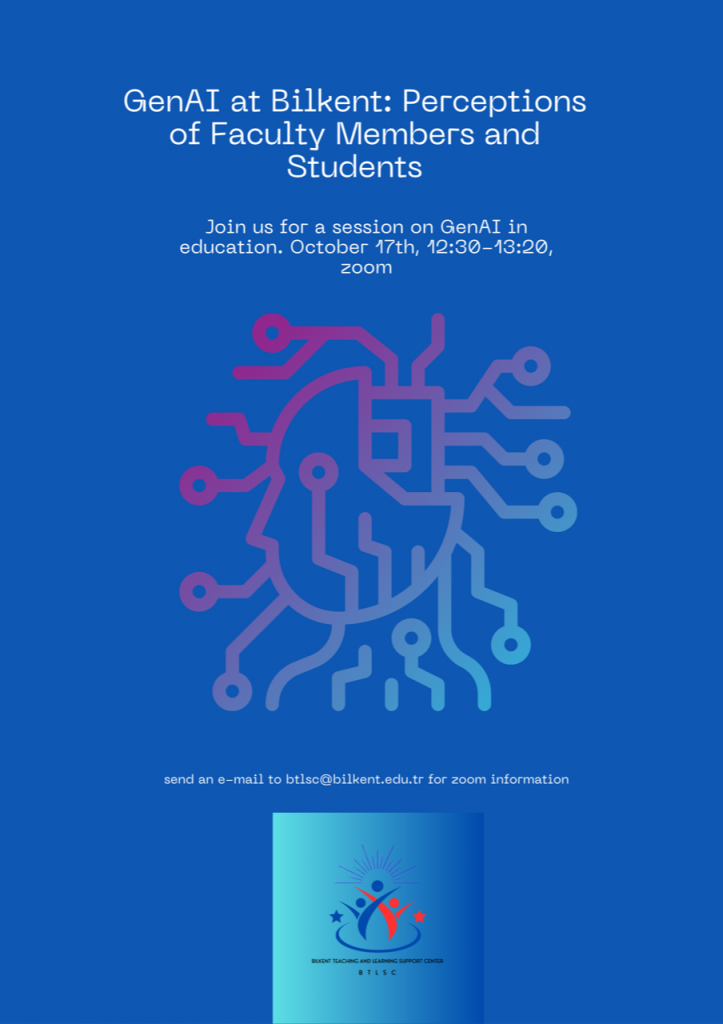 Join us for a session on GenAI in education.
Join us for a session on GenAI in education.
“GenAI at Bilkent: Perceptions of faculty Members and Student”
October 17th, 12:30 – 13:20, Zoom
(Please ask for the password: btlsc@bilkent.edu.tr)
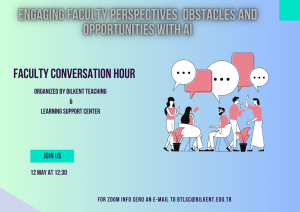
Faculty Conversation Hour:“Engaging Faculty Perspectives: Obstacles and Opportunities with Artificial Intelligence”
Friday, May 12, 2023 12:30 – 1:20 pm
(Please ask for the password: btlsc@bilkent.edu.tr)
Join our faculty conversation hour as we delve into the obstacles and opportunities presented by AI from a faculty perspective. This interactive session will bring together faculty members to share their experiences, challenges, and insights in implementing AI technologies, explore the limitations and biases, and discuss the potential of it in academic settings.
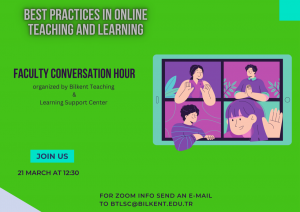 Faculty Conversation Hour: “Best practices in online teaching and learning”
Faculty Conversation Hour: “Best practices in online teaching and learning”
Tuesday, March 21, 2022 12:30 – 1:20 pm
(Please ask for the password: btlsc@bilkent.edu.tr)
Join us for a discussion on best practice in online teaching and learning. Participants will be invited to share their experiences, and collectively brainstorm strategies and methods for addressing what makes it best practice or what is best in online teaching.
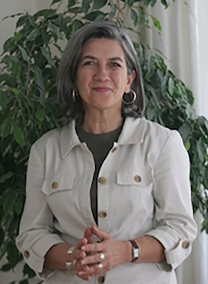 Travmatik Yaşantılarda Psikolojik İlk Yardım: Soru-Cevap Oturumu
Travmatik Yaşantılarda Psikolojik İlk Yardım: Soru-Cevap Oturumu
Friday, February 17, 2023, 3:00-4:00pm
Please see seminar’s video via the YouTube link.
Ülkece içinden geçtiğimiz bu zor günlerde, bir araya gelerek neler hissettiğimizi, birbirimize ve öğrencilerimize nasıl destek olabileceğimizi konuşacağımız Travmatik Yaşantılarda Psikolojik İlk Yardım konulu Bilkent Öğretim ve Öğrenim Destek Merkezinin Klinik Psikolog, Dr. Nedret Öztan’ın destekleriyle düzenleyeceği online Soru- Cevap oturumuna sizleri davet ediyoruz.
About Dr. Nedret Öztan
Dr. Nedret Öztan 1999 Kocaeli Depreminden sonra 3 yıl deprem bölgesinde, daha sonraki 2 yılda 25 ilde okullardaki psikososyal destek sistemini geliştirmek üzere MEB ve UNICEF koordinasyonunda çalışmıştır. Daha sonra da Bingöl Depremi (2003), Elazığ Depremi (2010), Van Depremi (2011) ve Bodrum Depreminde (2017) psikososyal çalışmaları yönetmiştir. Ayrıca İran depremi (2004) ve Pakistan depreminden (2005) sonra o ülkelerde, UNICEF and IFRC ile birlikte psikosoyal destek çalışmalarını yürütüp el kitaplarını hazırlamıştır. Deprem çalışmalarının yanısıra Mardin Katliamı (2009) ve Zonguldak (2010), Soma (2014) ve Ermenek (2014) maden kazalarından sonra, Reyhanlı Bombalamasında (2013) ve Kilis füze düşmeleri (2016) sonrasındaki psikososyal destek çalışmalarını yürütmüştür.
 “Psychological First Aid in Traumatic Experiences”
“Psychological First Aid in Traumatic Experiences”
February 15, 2023 1:00 – 2:00 pm
Place: Online Zoom Meeting
Please see seminar’s video via the YouTube link.
In this seminar, the social and psychological effects of traumatic experiences and emergency situations we may experience in our lives will be reviewed. These effects and reactions are considered normal reactions to abnormal events. The approach to deal with these effects, whether we experience ourselves or we observe in other people’ will be reviewed and discussed.
Note: This event is organized in cooperation with Bilkent University Teaching and Learning Support Center (Bilkent University), Center for Advancing Learning and Teaching (Middle East Technical University), Center for Teaching and Learning (TED University), Office of Learning and Teaching (Koç University), & Sustainable Teaching and Learning Center (Hacettepe University),
About Dr. Nedret Öztan
Dr. Nedret Öztan has worked in the field after 1999 Earthquake with the affected population in Kocaeli area for 3 years and another 2 years in 25 cities to implement the psychosocial programs in school system in coordination with the Ministry of Education and UNICEF. She has worked in the field in the planning and implementing psychosocial interventions after Bingöl Earthquake (2003), Elazig Earthquake (2010), Van Earthquake (2011) and Bodrum earthquake (2017). She has also worked in the field After Iran Earthquake (2004) and Pakistan Earthquake( 2005) with UNICEF and IFRC, planning psychosocial interventions and writing handbooks. She was also involved in planning and application of psychosocial interventions after Mardin Massacre (2009) and the mine accidents Zonguldak (2010), Soma(2014) and Ermenek (2014), as well as Reyhanli Bombing (2013) and Kilis (2016) missile attacks.
Coping with Traumatic Experiences
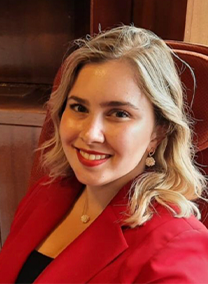 “Understanding and Managing the main Psychological Problems Experienced by Students”
“Understanding and Managing the main Psychological Problems Experienced by Students”
January 16-17-18, 2023 2:00-3:30 pm
(please ask for the password: btlsc@bilkent.edu.tr)
This seminar series aim to make a brief introduction to the main psychological problems experienced by students and help instructors to better understand and manage such situations they may encounter in their academic work. It consists of 3 days and a variety of topics will be covered.
- On the first day (January 16, 2023), mood and anxiety disorders, grieving period and ADHD will be discussed.
- The second day (January 17, 2023) will cover personality
- The last day (January 18, 2023) is spared for the question’s instructors have.
Note: It is not obligatory to attend all days of the seminar series. You can assume each day as a separate seminar.
About İ. Selin Günhan
İpek Selin Günhan is a clinical psychologist and psychotherapist. She received her Bachelor’s Degree with Cum Laude from Bilkent University Department of Psychology. She spent a semester in the University of Groningen as an exchange student. During her undergraduate studies she worked as a research assistant in the National Magnetic Resonance Research Center (UMRAM) Visual Perception and Attention Laboratory and Bilkent University Development Psychology Research Center. She completed her Bachelor’s thesis “Influence of Genetics on Cognition: Relationship Between IQ and Working Memory in Adolescent and Young Adult Twins” in UMRAM Brain Development and Psychosis Studies Laboratory. She did her internship at Hacettepe University Hospitals Department of Psychiatry.
She received her Master’s Degree in Clinical Psychology from Başkent University with her thesis titled “Investigation of Relationship and Partner-Centered Obsessions in Borderline Personality Organization in an Object Relations Perspective”. She continued her research and psychotherapeutical activities in Başkent University Stress Management Applications Center. Then she worked as a clinical psychologist and psychotherapist in Ankara Madalyon Psychiatry Center. Now she is a clinical psychologist and psychotherapist in Bilkent University, where she also teaches at the Department of Psychology.
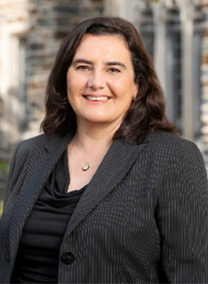 “Defining the Future of Universities through Learning Innovation”
“Defining the Future of Universities through Learning Innovation”
Tuesday, December 20, 2022 4:00 pm
(please ask for the password: btlsc@bilkent.edu.tr)
There are major drivers in place that are forcing us to think of higher education in novel ways. Technological advances such as AI and machine learning make some jobs obsolete and dramatically change the skill sets required for other jobs. This churn of knowledge accelerates a skills gap, which leaves our graduates in need of updating their knowledge and skills as rapidly as within a year. Almost everywhere in the world, the traditional student population is shrinking due to demographic shifts and an aging population. Fifty percent of the children born in the Western world today will live to be 100 years old (Gratton and Scott, 2016). There are sociological, societal, and personal implications of a longer life for health, education, finance, security, transportation, etc. systems. To survive the longer life and longer careers during which we will have to learn and re-learn, educators need to be planning for a 60-year curriculum and respond to the market demand of the fastest increasing segment of population, the 65+ learners (Golden, 2022). Our global society also demands higher education to serve broader populations and re-establish education’s power for upward mobility, social justice, and equity. Our problems of future of workforce and education demand solutions that will work at scale and for diverse groups of learners. Learning innovation, though not only intelligent use of technologies, but also through rethinking educational pathways, pedagogies, business models, and lifespan of learning, has a lot of promise for the future of higher education.
About Dr. Gazi
Yakut Gazi is the Vice Provost for Learning Innovation and Digital Education at Duke University. In this role, she oversees the offices of Learning Innovation and Continuing Studies, with responsibility for the development and execution of pedagogical innovation and digital education strategies, youth academic enrichment programs, and continuing education and lifelong learning offerings. Previous to this position, she was the Associate Dean for Learning Systems at Georgia Tech Professional Education. Her higher education experience spans almost 29 years in four countries. She served on the Academic Advisory Council for Quality Matters©, is an elected council member and First Vice President of the International Association for Engineering Continuing Education (IACEE), and an at-Large Board Member of the University Professional and Continuing Education Association (UPCEA). Dr. Gazi has her Ph.D. in Educational Psychology from Texas A&M University, and an M.A. in Educational Sciences and a B.S. in Teaching Chemistry, both from Bogazici University in Turkey. A native of Istanbul, Dr. Gazi is married, with a daughter.
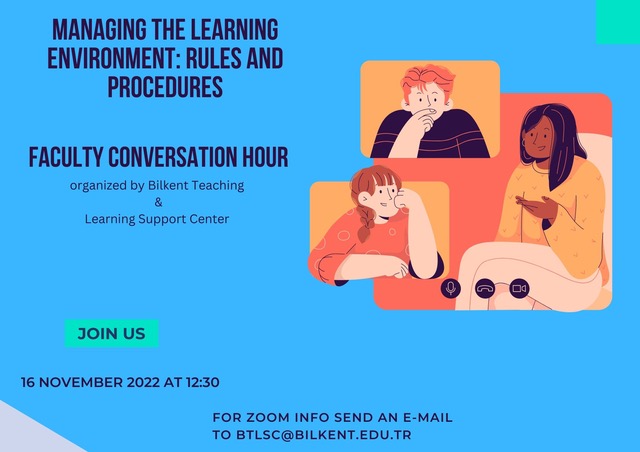 Faculty Conversation Hour: “Managing the learning environment: Rules & Procedures”
Faculty Conversation Hour: “Managing the learning environment: Rules & Procedures”
Wednesday, November 16, 2022 12:30 – 1:20 pm
(please ask for the password: btlsc@bilkent.edu.tr)
Join us for a discussion on managing the learning environment: How can we maintain the order in the learning environment? Do we need rules and procedures? How can we decide rules & procedures of the environment?
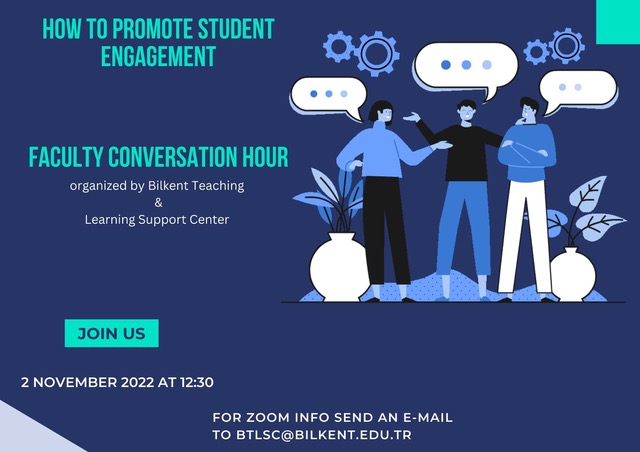 Faculty Conversation Hour: “How to Promote Student Engagement”
Faculty Conversation Hour: “How to Promote Student Engagement”
Wednesday, November 2, 2022 12:30 – 1:20 pm
(please ask for the password: btlsc@bilkent.edu.tr)
Join us for a discussion on how to promote student engagement. Participants will be invited to share their experiences, and collectively brainstorm strategies and methods for increasing student engagement.
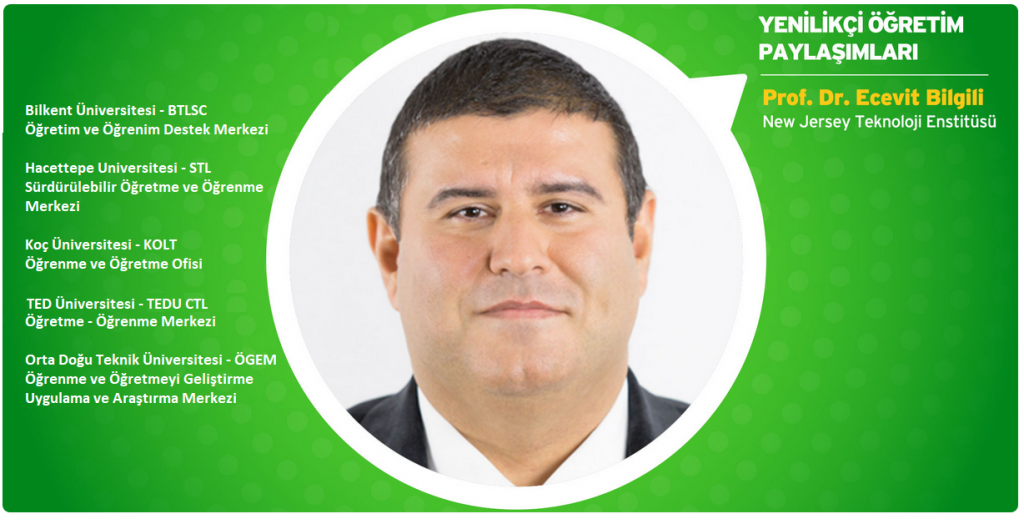
“Dersler Ölü Değildir: Mükemmel Dersler İçin Etkili Stratejiler”
Tuesday, October 25, 2022 2:00 – 3:00 pm
(please ask for the password: btlsc@bilkent.edu.tr)
Konuşmam, Boğaziçi ve IIT üniversitelerinde 9 senelik öğrenci, NJIT’de 13 senelik professor olarak derslerdeki gözlemlerime ve deneyimlerime dayanıyor. Gerçekten, dersler ögrenciler tarafindan “ölü” olarak görulebilir. Konuşmamın ilk kısmı, buna sebep olan faktorler, özellikle de BASF’in adlandırdığı “Human Element (Insan Elementi)” üzerine yoğunlasacak. Oğretmen ve öğrenci davranıs, yetenek, ve yaklaşımlarının neden ve nasıl olu derslere sebep oldugundan bahsedecegim. Konuşmamın ikinci kısmı ise, mini-ders–aktif öğrenme–ilgi çekme teknikleriyle derslerin nasıl daha etkili hale getirebileceğine yoğunlaşacak.
About Dr. Bilgili
Dr. Ecevit Bilgili NJIT Kimya ve Materyal Mühendisliği Bölümünde profesör, başöğretmen, ve bölüm başkan yardımcısıdır. Kendisi Parçacık Mühendisliği ve Eczacılık Nanoteknoloji Laboratuvarı’nda ilaçlar gibi yüksek katma-değerli ürünlerin formülasyon–işlem tasarımı üzerine araştırma yapmakta ve onların işlevselliğini arttırmaktadır. Araştırmaları, ilaç nanoparçacıklarının yukarıdan-aşağıya ve aşağıdan-yukarıya üretim yaklaşımlarındaki oluşum mekanizmaları, nanokompozit mikroparçacıklar, ve amorf katı dispersiyonlar üzerine yoğunlaşmıştır. Dr. Bilgili, akademik görevlerinden önce, 2004–2009 yılları arasında Merck şirketinin Ar-Ge ve İlaç Ticarileştirme Bölümlerinde baş geliştirme mühendisi olarak çalışmıştır.
Dr. Bilgili, Parçacık Teknolojisi toplumunun iyi tanınan üyelerinden biridir. Amerikan Kimya Mühendisliği Enstitüsü (AIChE) Parçacık Teknolojisi Forumunun Seçilmiş Yönetici Komite üyesi olarak hizmet vermiştir. Kendisi, AIChE Alan3a: Parçacık Üretimi ve Karakterizasyonu’nun başkan ve başkan yardımcılığını yapmıştır. Dr. Bilgili’nin 100’e yakın hakemli makalesi, 5 Amerikan patenti, ve birçok buluş ifşası vardır. 120’den fazla ulusal ve uluslararası konferans sunumu ve 30’dan fazla davetli konuşma vermiştir. Dr. Bilgili Advanced Powder Technology dergisinin Yardımcı Yönetici Editörü, Pharmaceutics ve Powders dergilerinin editörü, ve Pharmaceutical Research dergisinin Editör Danışma Kurulu üyesidir. Kendisi NJIT’den birçok Öğretimde Mükemmeliyet ödülü ve AIChE’den George Klinzing Parçacık Teknolojisinde En İyi Doktora Tezi Ödülü’nü almıştır. 2022 yılında, AIChE akademi üyeliğine seçilmiştir.
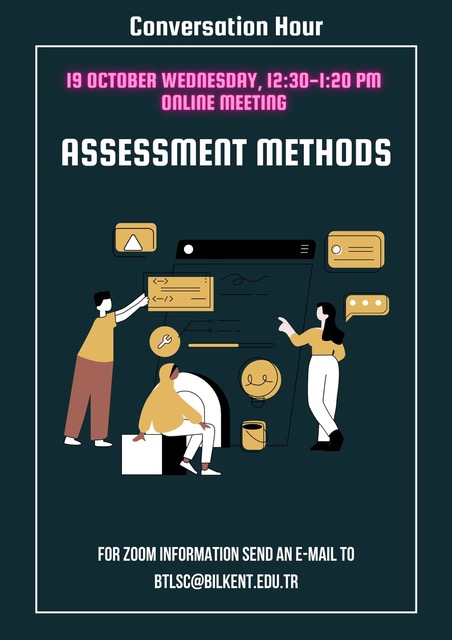 Faculty Conversation Hour: “Assessment Methods at Higher Education”
Faculty Conversation Hour: “Assessment Methods at Higher Education”
Wednesday, October 19, 2022 12:30 – 1:20 pm
(please ask for the password: btlsc@bilkent.edu.tr)
Join us for a discussion on questions such as: How can we make sure that we are using the correct assessment methods for the class? What is the value of formative assessment? How can we provide effective feedback after assessment?
“Encouraging Student Preparation”
Monday, October 3, 2022 12:30 – 13:20 pm
Engineering Building, EA 409
Join us for a discussion on questions such as: How can we make sure that the students come to the class meetings prepared? How can we encourage them to review the material from the past class meetings, do the readings, etc. before they come to the class?
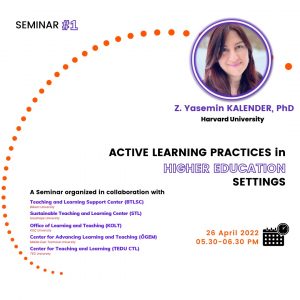 “Active Learning Practices in Higher Education Settings”
“Active Learning Practices in Higher Education Settings”
Tuesday, April 26, 2022 5:30 – 6:30 pm
(please ask for the password: btlsc@bilkent.edu.tr)
In recent decades, higher education teaching has been enhancing their teaching methods to engage students in a more meaningful way in their learning processes. Instead of content-delivery with a teacher-centered classroom, educators have shifted the focus of their instruction more towards learner-centered methods. Active Learning (AL) has been a crucial part of this reformation and shown to improve students’ learning across different disciplines (Freeman et al, 2014). In this talk, I will discuss the benefits of using AL methods both for faculty and students and how to effectively incorporate these methods into classroom via creating an equitable student experience and participation.
About Dr. Kalender
Dr. Z. Yasemin Kalender is an Assistant Director of Science Education at Harvard University and an upcoming Assistant Professor at the Physics and Astronomy Department at the Rochester Institute of Technology doing physics education research. Dr. Kalender’s overarching research interests are in studying diversity issues in the physics discipline, investigating motivational characteristics of students, and incorporating mixed method and big data analysis techniques into the area of physics education research. Her current research lines are student motivation, equity and diversity in physics at all levels, group work in lectures and lab courses, sense of agency in hands on learning spaces, and graduate teaching assistants’ views and teacher identities.
Faculty Conversation Hour: “Peer Assessment between Students”
Wednesday, April 13, 2022 12:30 – 13:30 pm
Let’s come together to discuss how to make peer assessment between students in the classroom. Why use peer assessment? What are the types and examples of peer assessment? Have you ever experienced one? What should we do during and after peer assessments and/or review sessions? What are the benefits and limitations of peer assessment?
Faculty Conversation Hour: “Communities of Practice”
Wednesday, March 30, 2022 12:30 – 13:30 pm
Join us for a discussion about finding answers to such questions: What are communities of practice (CoP)? Have you ever experienced one? What kind of CoP could be formed? What do you think about peer observation? Would you like to be observed by a peer and get feedback?
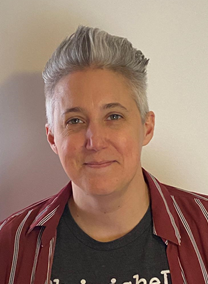 “Ways to Differentiate Instruction”
“Ways to Differentiate Instruction”
Thursday, April 7, 2022 15:30 – 16:30
(please ask for the password: btlsc@bilkent.edu.tr)
There is no such thing as a homogeneous class, even when students are identified at the same level based on previous courses or standardized assessments. Differentiated Instruction allows educators to attend to the needs of diverse learners, while ensuring that all students are working toward mastery. “Differentiated Instruction is student-aware teaching” (Tomlinson, 2008, p. 27). The purpose of differentiation is to promote conceptual understanding through student engagement, learner autonomy, and inclusivity.
Instruction can be differentiated through five elements of learning: Process, Product, Content, Environment, or Affect (Tomlinson, 2014). Effective differentiation is proactive, it involves the use of cooperative learning groups, and it is learner and knowledge centered (Tomlinson et. al, 2003). Educators should anticipate student thinking, allow for student choice in accessing content, and provide consistent opportunities for feedback and reflection. This interactive presentation will model each of the five ways to differentiate instruction within the 5E model for Inquiry-Based Instruction: Engage, Explore, Explain, Elaborate, and Evaluate (Bybee et al., 2006). These strategies may be implemented for face-to-face, hybrid, or remote instruction.
About Dr. Alexander
Primary research interest of Dr. Alexander is in the teaching norms and instructional strategies of both secondary and post-secondary mathematics instructors, with a focus on Inquiry-Based Learning, Differentiation, and STEM Education. Dr. Alexander plans to continue this research agenda with the objective of improving post-secondary mathematics education by teaching and modeling effective practice for the next generation of mathematics instructors, and by implementing Inquiry into advanced mathematics courses. Teaching philosophy of Dr. Alexander’s is aligned with research interests. As a constructivist, Dr. Alexander believes in engaging students in inquiry and active learning, cultivating a classroom environment that promotes productive struggle, and setting high expectations for pre-service teachers’ mastery of content in mathematics. In addition to mathematics education and educational statistics courses, Dr. Alexander also teaches Trends and Issues in Education, and Assessment courses within the Curriculum and Instruction masters and doctorate programs to pre-service and in-service teachers from a variety of content areas. Dr. Alexander models effective practice in teaching, with the hope that pre-service teachers implement engaging activities, differentiate their lessons, and seek reflections and feedback as lifelong learners.
“Faculty Conversation Hour”
Wednesday, March 16, 2022 12:30 – 13:30 pm
Join us for a discussion on the best practices in handling student excuses. We frequently receive excuses from students for not attending the class meetings, missing the exams or late submissions. Several issues arise when we receive an excuse, such as, the validity of the excuse, whether to accommodate the student, and if so, how to accommodate the student. And, we can also ask how we can design our courses in the first place in order to create a learning environment in which students with legitimate excuses are treated fairly and in which it is easier for us to handle student excuses when they occur. In this conversation hour, participants will be invited to share their experiences, and collectively brainstorm strategies and methods for addressing these and similar questions.
“Faculty Conversation Hour”
Wednesday, March 2, 2022 12:30 – 1:30PM
Join us for a discussion on best practice in teaching and learning. Participants will be invited to share their experiences, and collectively brainstorm strategies and methods for addressing what makes it best practice or what is best in teaching.
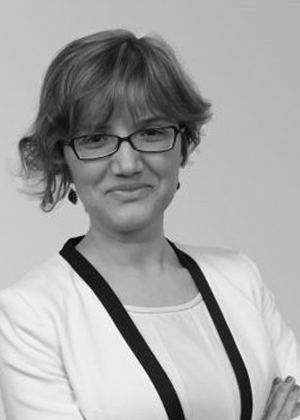 “Learning-Centered Course Design and Delivery”
“Learning-Centered Course Design and Delivery”
January 26 & January 27, 2022 11:00 – 12:00
Please see Seminar’s Presentationand Videos (Day I and Day II)
(please ask for the password: btlsc@bilkent.edu.tr)
Since the 1990s, research results in higher education have shifted our attention from traditional instructor-centered approaches to student-centered approaches that put learning at the forefront. In this interactive workshop series, we will focus on learning-centered course design and delivery methods that require an instructor to assume the roles of designer and facilitator to give more responsibilities to students. Participants will be able to reflect on how to apply what they gain in this workshop in designing their new courses.
About Zuhal Zeybekoğlu
Dr. Zuhal Zeybekoğlu is currently with the Koç University Office of Learning and Teaching (KOLT). She is the director of the Office, responsible for managing professional development programs for faculty and academic support services for students and assisting colleges and schools in their internal evaluation processes. With over 20 years of experience in higher education, her main research interests focus on learning and teaching in higher education. She has joined several SoTL projects and published them in national and international journals. Please visit KOLT’s website to view her CV.
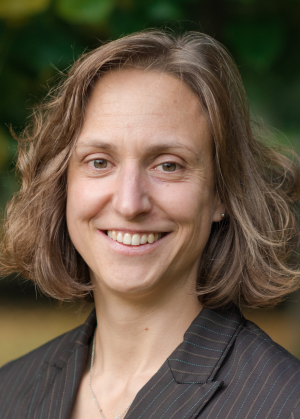 “Employing outdoor and experiential learning strategies to promote deep learning and transformative competencies in learners”
“Employing outdoor and experiential learning strategies to promote deep learning and transformative competencies in learners”
Thursday, November 25, 2021 12:30 – 13:30 pm
Global entities like the UNESCO and OECD call for transformativecompetencies as crucial factor for successful lives and prosperous, sustainable societies. Such educational objectives go far beyond the scope and remit of most higher education (HE) programs. Nevertheless, there are approaches to learning and teaching that are shown to be very successful in transporting the curriculum while also nurturing transformative competencies in learners. This session presents frameworks and benefits of outdoor and experiential learning in HE contexts, and offers practical guidance on how to integrate outdoor and experiential learning elements into HE courses to promote deep learning and transformative competencies in learners.
About Jule Hildmann
Jule Hildmann (PhD) is a Senior Research Fellow in Outdoor Environmental Education at the University of Edinburgh, Scotland/UK. Her work focusses on promoting social and personal competencies through outdoor and experiential learning. Jule holds qualifications in formal education, counselling, crisis intervention, and outdoor adventure education. She is internationally active as academic, consultant, train-the-trainer (at the Centre for Experiential Education, Germany), and is lead researcher in the EU project ‘From Outdoors to Labor Market’, which uses outdoor learning to reduce youth unemployment in several European regions.
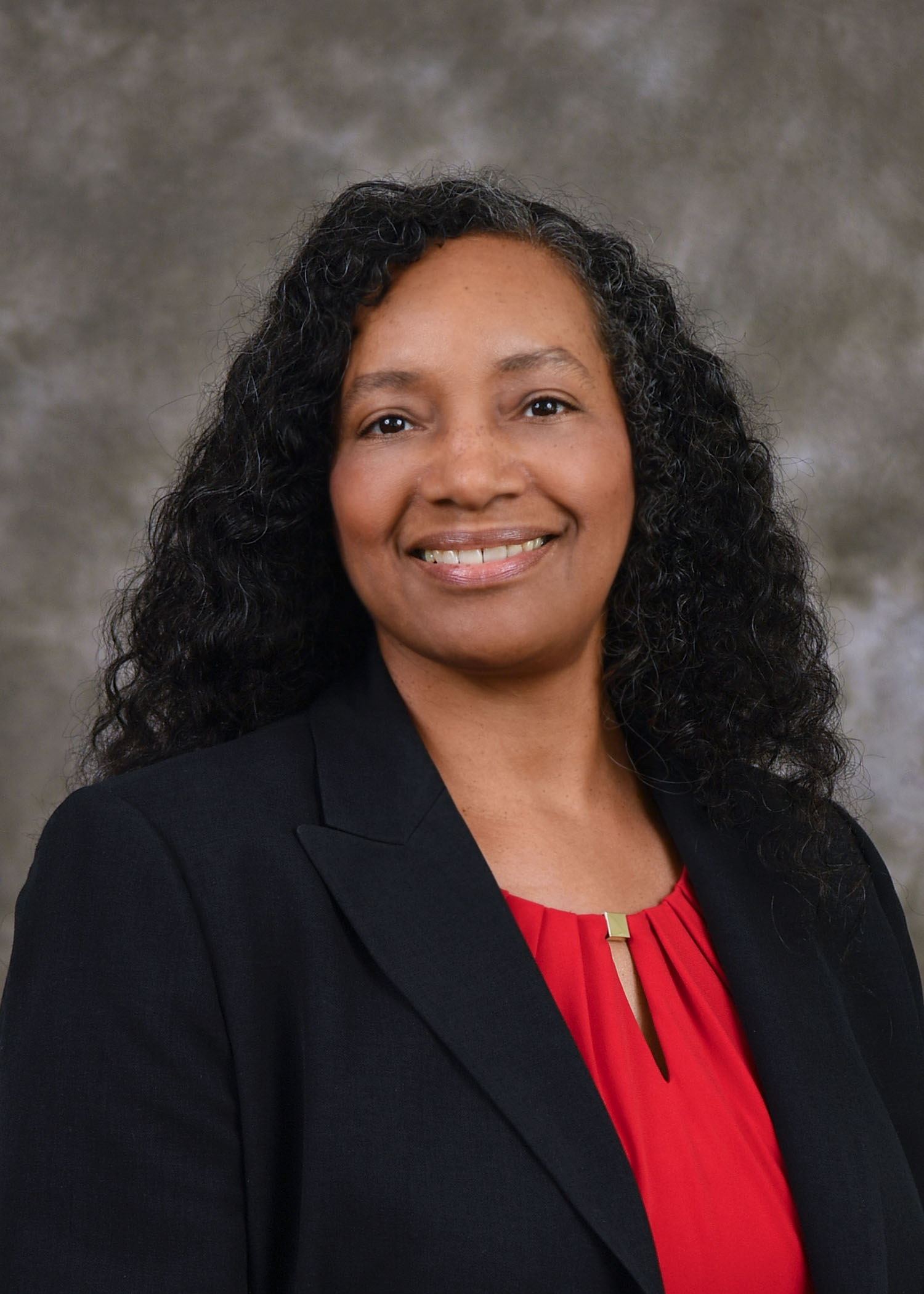 “Designing Assignments for Student Success”
“Designing Assignments for Student Success”
Wednesday, November 3, 2021 6:30 – 7:30 pm
Classroom assignments can support students in or prevent them from performing to the best of their ability. We will discuss features of assignments that pose challenges to students’ ability to demonstrate proficiency and ways in which assignments can be improved to support the success of all students.
About Christine Robinson
Dr. Christine Robinson is the Executive Director of the Office of Assessment and Accreditation at the University of North Carolina at Charlotte where she leads a team that promotes continuous improvement in student learning, educational practices, and support services. Dr. Robinson organizes and facilitates campus and UNC System level assessment and accreditation efforts. As the University’s Southern Association of Colleges and Schools Commission on Colleges liaison, she coordinates and compiles University-wide compliance documentation. She co-chairs the Grand Challenges in Assessment Project, a national initiative to create a strategic plan for assessment in higher education. Dr. Robinson received her Ed.D. in Curriculum and Instructional Leadership from Vanderbilt University. Her research examines the effects of classroom assessment on equity gaps and interventions that support student success. Previously, Dr. Robinson served as the Dean of Business and Information Technology and the Dean of Planning, Assessment and Quality Improvement at Seminole State College, the Associate Dean of Business and Information Systems at Waubonsee Community College, and the Director of Academic Affairs at Indiana Institute of Technology. Her more than 22 years of administrative experience includes collaborating with and leading faculty and staff in the assessment of educational practices and programs and institutional effectiveness.
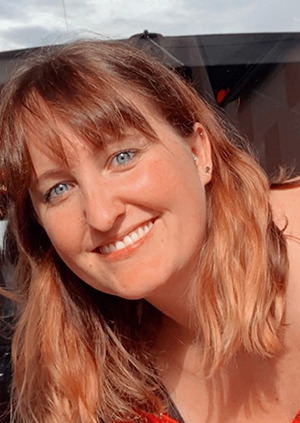 “Sustainable assessment: Designing continuous assessment to encourage student learning for the longer term”
“Sustainable assessment: Designing continuous assessment to encourage student learning for the longer term”
Wednesday, October 27, 2021 12:30 – 13:30 pm
This seminar will address the issue of sustainable assessment in higher education. After defining sustainable assessment, we will address how we can design our assessment tasks to help students develop skills that are useful not only for immediate learning, but also for the longer term. The primary focus will be on ways to involve students in assessment to develop their assessment literacy while working on any course topic. Based on an example of a continuous assessment design, participants will reflect on how they could implement some principles of sustainable assessment in their own courses.
About Céline Girardet
Céline Girardet is a Master Assistant and lecturer at the university of Geneva (Switzerland), in the research group “assessment, regulation, and differentiation of learning”, directed by Prof. Lucie Mottier Lopez.
She completed her PhD in educational sciences on the topic of the evolution of vocational teachers’ beliefs regarding classroom management. During her PhD, she worked as a Junior Researcher at the Swiss Federal Institute for Vocational Education and Training (Lausanne, Switzerland). She also worked as a visiting scholar at Monash University (Melbourne, Australia) on a project about motivation to choose teaching.
Her current research focuses on assessment in higher education, specifically regarding continuous assessment, peer feedback, sustainable assessment, prosocial assessment, the role of emotions in assessment and feedback, and the evolution of teachers’ assessment-related beliefs. Her interests also include peer reviewing practices in scientific publishing. She is co-creator and co-editor of a scientific journal focusing on assessment in education (La Revue LEeE), which promotes an open and collaborative approach to peer reviewing.
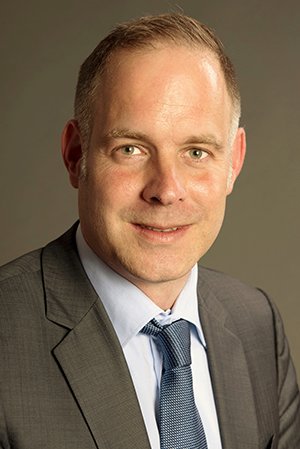 “The effect of gamified in-class activities in Flipped-Classroom settings in Higher Education – in general and specific!”
“The effect of gamified in-class activities in Flipped-Classroom settings in Higher Education – in general and specific!”
Wednesday, October 20, 2021 12:30 – 13:30 pm
Please see Seminar’s Video
(please ask for the password btlsc@bilkent.edu.tr)
For higher education, the question of how in‐class activities can be supported in large lectures is of great relevance. Goal of this seminar is it to present the findings of flipped classroom approaches and gamification and its challenges in higher education. I also give specific insights on an experimental study with 205 students that performed either gamified in‐class activities using a gamified quiz with team competition, or non‐gamified in‐class activities using exercise sheets. Results show a positive indirect effect of gamification on application‐oriented knowledge that is mediated by learning process performance. Furthermore, results show positive effects of gamified in‐class activities on motivation.
About Maximilian Sailer
Maximilian Sailer is Professor of Educational Sciences at the University of Passau, Germany. He is also the Dean of Research of his faculty. His areas of academic interest include technology‐enhanced learning, blended learning and empirical educational research.
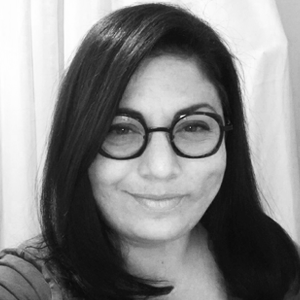
Effective and Interactive Material Design with Web 2.0
Thursday, February 25, 2021 12:30 – 13:30 pm
This seminar aims to introduce some Web 2.0 tools that are easy to use and do not require heavy technical skills. Via these Web 2.0 technologies, you can support the learning process by carrying your lessons outside the classroom with effective and interactive content, or prepare interactive and remarkable course materials for your students at a distance.
The seminar starts with general visual design and instructional material preparation principles followed by easy-to-use and easy to integrate Web 2.0 tools. With these tools, you can create beautiful visual communication solutions transforming text-heavy content into a visual story with infographics, interactive social media graphics, etc.as well as instant measurement and evaluation, where you can provide instant feedback as a vital part of the learning process.
About Göknur Kaplan
Dr. Goknur KAPLAN works as an assistant professor at the Middle East Technical University (METU), Faculty of Education, Department of Computer and Instructional Technologies and as an assistant chair at METU Center for Science Technology Engineering and Mathematics Education (BILTEMM). She completed her undergraduate education at Hacettepe University, Faculty of Education, Department of Secondary Science and Mathematics Education, Mathematics Education Program in German in 2001 ranking first in the Faculty of Education. In 2004, she received her master’s degree from the Department of Computer and Instructional Technologies Education, METU with her thesis titled “FIDGE Model: Instructional Design / Development Model Proposal for Game-like Learning Environments”, which was nominated for many national and international awards. She completed her doctorate in 2010 with her dissertation titled “Knowledge Exchange Patterns in ESPN’S FastBreak Community” from Penn State University, Instructional Systems Program. Selected as “Academic All-Star” for two consecutive years by Microsoft Research and Serious Games Summit, Dr. Kaplan has national and international publications on various topics. She conducts her research on issues such as the integration of Web 2.0 technologies into education, digital literacy, games and gamification, social network analysis, etc.
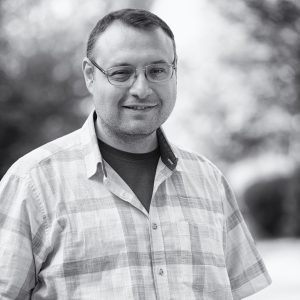
Alternatives to Traditional Exams
Thursday, January 21, 2021 11:00 – 12:00
In this workshop, we’ll discuss alternative assessment techniques to traditional exams. In addition to discussing some examples of widely used non-traditional assessment techniques in student-centered pedagogies, we’ll also talk about the criteria for a successful assignment and how to design new assignments considering the particular requirements and circumstances of a given course.
About Tufan Kıymaz
Dr. Tufan Kıymaz received his PhD in Philosophy, with a minor in History and Philosophy of Science, from Indiana University, Bloomington, in 2017. The same year he joined Bilkent University Department of Philosophy. His main areas of research are philosophy of mind and philosophy of well-being. He was active in Indiana University Center for Innovative Teaching and Learning, both as a regular participant in workshops and learning communities, and also as a workshop facilitator. At Bilkent, he is organizing seminars and weekly workshops for students in collaboration with Bilkent Psychological Counseling and Development Center.
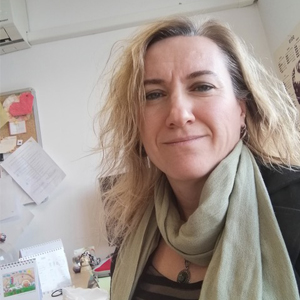 “Classroom Management in Higher Education”
“Classroom Management in Higher Education”
Tuesday, December 1 2020 2:00 – 3:00 pm
Classroom management is complex, and different elements of it need to be thought when making decisions about certain circumstances. As instructors, we have several questions in our mind about effective management and control. How is order established and maintained? How to behave in what type of misbehavior? What type of classroom management model is affective in which classroom? What are some of my personal and professional characteristics that might affect the decisions about classroom management? In this workshop, we will explore the definition of classroom management in 21st century in higher education. Afterwards, with an inventory we will find out our beliefs on discipline. Lastly, we will discuss the common classroom management problems in our classrooms, and possible solutions to them which may lead us to another gathering about online classroom management.
About Armağan Ateşkan
Dr. Armağan Ateşkan received her PhD. in Computer Education and Instructional Technologies from Middle East Technical University, in 2008. She has been working at Bilkent University Graduate School of Education since 2002. She also worked as at Özel Bilkent Lisesi as a biology teacher, and as an educational technologist at an international school in Belgium. Her research interests are classroom management, ICT in education, STEM education, international education, health education, sustainability and outdoor education. She has led internationally and nationally funded research projects. She has published books, and articles in international and national journals. She is also organizing workshops and seminars for students and teachers in schools.
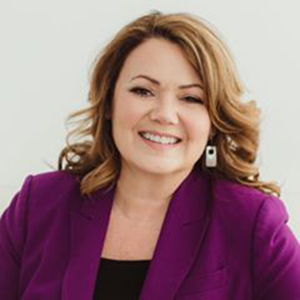 “The Struggles and Compromises of Active Learning in Crisis Remote Teaching”
“The Struggles and Compromises of Active Learning in Crisis Remote Teaching”
Wednesday, November 25 2020 2:00 – 3:00 pm
No matter where you teach or learn, 2020 has been a difficult year. For instructors who focus on active learning, the forced and sudden move to a remote or online environment poses particular challenges. In this interactive Zoom session, participants will look at some of the basic tools in active learning – the lecture pause, the quickwrite, and the think/pair/share – to explore how they can be adapted to a remote experience. We will also discuss some of the difficulties both students and instructors can face, whether in synchronous or asynchronous classes.
About Shannon Murray
Shannon Murray is a professor and 3M National Teaching Fellow (2001). She teaches Early Modern and Children’s literature at the University of Prince Edward Island, on the east coast of Canada. She gives workshops and talks on Active Learning, Capstone University Courses, Learning Communities, and Teaching Dossiers, including since 2002 for the PEI Faculty Development Summer Institute on Active Learning. The founding editor of The Recorder, she has published on Bunyan’s Book for Boys and Girls, on adaptations for children, as well as on the scholarship of teaching and learning. Her book Bounce and Beans and Burn won the L. M. Montgomery Literature for Children Award. Along with her collaborators Dr. Lisa Dickson and Dr Jessica Riddell, she is completing a book project for the University of Toronto Press on Critical Hope and Critical Empathy in the Teaching of Shakespeare.
 “A Stoic Approach to Teaching: Theory and Practice”
“A Stoic Approach to Teaching: Theory and Practice”
Tuesday, November 17 2020 2:00 – 3:00 pm
Stoicism is an ancient philosophy, which has been gaining popularity as a modern philosophy of life in recent years. Stoicism emphasizes self-improvement, self-discipline, virtue, wisdom based on our ability to distinguish between what is in our control and what is not, and courage to face the truth. If we apply Stoic principles to teaching, what we get is a student-centered pedagogy that emphasizes student empowerment and autonomy, and aims to cultivate skills and attitudes that are necessary for students to become efficient self-learners. In this workshop, we will discuss theoretical and practical Stoic insights about teaching, with an emphasis on humanities and social sciences.
About Tufan Kıymaz
Dr. Tufan Kıymaz received his PhD in Philosophy, with a minor in History and Philosophy of Science, from Indiana University, Bloomington, in 2017. The same year he joined Bilkent University Department of Philosophy. His main areas of research are philosophy of mind and philosophy of well-being. He was active in Indiana University Center for Innovative Teaching and Learning, both as a regular participant in workshops and learning communities, and also as a workshop facilitator. He is a certified Philosophy for Children (P4C) training specialist. At Bilkent, he is organizing seminars and workshops for students in collaboration with Bilkent Psychological Counseling and Development Center.
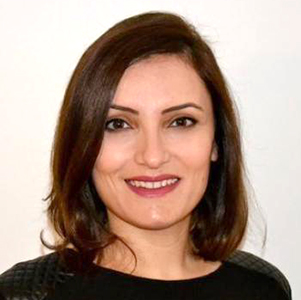
Transition to Online Teaching during the COVID-19 Pandemic: A Human-Centered Approach
Monday, July 27, 2020 17:00 – 18:00
Please see Seminar’s Video
(please ask for the password btlsc@bilkent.edu.tr)
Educational institutions all around the world are going through the emergency transition to remote teaching due to the COVID-19 pandemic. How do you get started with online teaching in the face of a global pandemic? How do you establish quality online learning and teaching experiences? In this session, we will look at some human-centered principles that underpin effective online teaching, best practices to guide your online teaching, and ways to establish an effective community of inquiry in your online courses.
About Evrim Baran
Evrim Baran is an associate professor of educational technology and human computer education programs at Iowa State University. Her research examines effective strategies for the design of mobile, online, and flexible learning environments in teacher education, engineering education, and STEM learning contexts. She directed international grants and research projects on mobile/online learning, K-12 engineering, STEM education, and teacher/faculty professional development. She teaches courses on online learning, learning design, and evaluation of digital learning environments.
Baran completed her PhD on educational technology and human computer interaction at Iowa State University, and her M.S. and B.S. degrees at Middle East Technical University (METU). She completed her postdoctoral fellowship within the department of Curriculum and Pedagogy at the University of British Columbia, Canada. Prior to her position at ISU, she worked as an assistant professor of educational sciences and associate director for the Center for STEM Education at METU. She was also the visiting professor at the Technical University of Munich, Germany. Her career highlights include early career award, best paper awards, research and teaching excellence awards, outstanding young researcher awards at AERA, SITE, and AECT organizations and conferences. She worked on online course design, program evaluation and needs assessment projects within the university and in nationwide projects. More information about her work is at www.evrimbaran.com
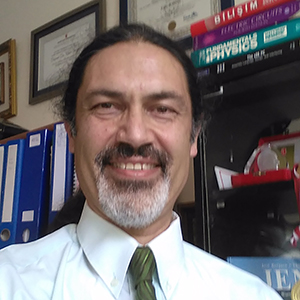 Sharing and Exchanging Experiences about Online Education
Sharing and Exchanging Experiences about Online Education
Wednesday, May 20, 2020 13:00 – 14:00 pm
Zoom Meeting ID: please ask for the zoom link
The talk will be about exchanging ideas and experiences in electrical and electronics engineering education. The on-line seminar is desired to be interactive, especially managing crowded sections and on-line examinations.
About Uğur Baysal
Dr. Uğur BAYSAL got his B.Sc. degree from Middle East Technical University in 1988 and continued his education in Worcester Polytechnic Institute (Massachusettes USA), Department of Biomedical Engineering and got his Ph.D. degree in Department of Electrical and Electronics Engineering of Hacettepe University in 1999. He went to post-doctoral research activity in Freidrich Schiller University, Jena-Germany in 2001 and continued to be a visiting scientist in various years afterwards. He has published numerous scientific works as journal article and conference proceedings papers, finished projects supported by TÜBİTAK and Scientific Research Coordination Unit of Hacettepe University.
The discipline of education has always been one of the main interests of him. In the years 1995-1996, he had completed pedagogical formation certificate training, between 2002 and 2004, he supervised M.Sc. thesis work related to remote laboratory course education in electronics engineering curriculum. He had published conference proceedings works abroad, worked as Hacettepe University Vocational School Administrator and Instructor between 2002-2012, acted as European Union project assessor related to vocational education and training individuals to combat unemployment. For more than 4 years, he has published his course films in social media environment and giving at least 6 electrical engineering courses per year, including summer terms.
Cooperative Learning Techniques
Thursday, April 16, 2020 12:40 – 1:30 pm
Zoom Link:https://zoom.us/j/2819561609?pwd=eXBLU3dRS3JRd2x2ZEFkRE1LVEVBQT09
Cooperative learning techniques play an important role in active student involvement into university courses. This workshop aims at exploring and practicing such techniques as Jigsaw, Think-Pair-Share, Round Robin, Numbered Heads, Three-Step Review which may easily be transferred into various courses under several disciplines. Participants are advised to bring their mobile devices (mobile phones, lap tops etc.) to the workshop.
About Erdem Aksoy
Dr. Erdem Aksoy worked as an English language teacher and instructor at various institutions and started working at Ted University in 2015. He acted as the manager of Center for Teaching and Learning at TED University for two years.
Dr. Aksoy has international and national publications and conference presentations on teacher education policies, foreign language teaching policies, programs and program evaluation.
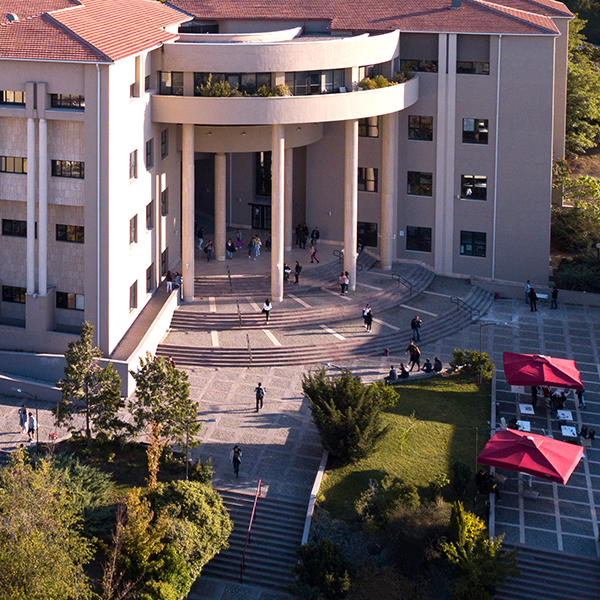 How to increase student involvement in the classroom?
How to increase student involvement in the classroom?
Wednesday, February 19, 2020 12:40 – 1:30 pm
Engineering Building, EA 409
Speaker: Jamel Ben Chafra
Abstract: In nowadays globalized world, highly competitive education environment and vertiginous means of distractions, increasing students’ involvement in classrooms is becoming a critical issue. Therefore, devising means / techniques / tools to increase student engagement is of indispensable importance to increase active learning geared towards, ultimately, improving intellectual achievement, critical thinking and commitment to life-long learning, improving performance and reducing dropout rates.
About Jamel Ben Chafra
Jamel Ben Chafra graduated from Bilkent University’s Tourism & Hotel Management department in 1994 and obtained his MBA degree from the same university in 1996. After a 1-year Assistant Financial Manager position occupied at an Arline charter company in Tunisia, he decided to join the academia. He started his academic career at Bilkent University in January 1998 and, since then; he has been a lecturer at the department of Tourism and Hotel Management. Starting from 2005, he is appointed as the department vice chair responsible for students’ affairs. In 2003, Jamel Ben Chafra was one of the recipients of the prestigious Bilkent University’s Distinguished Teaching Award.
Adapting Active Learning Strategies in Our Classes
Wednesday, November 27, 2019 12:40 – 1:30 pm
Electrical and Electronics Engineering, EE 01
Speaker: Prof. Dr. Emin Çivi, Faculty of Business Administration, University of New Brunswick
Abstract: In active learning, students become active participant in their own learning process as they partake in meaningful class activities rather than passively listening (Bonwell and Eison, 1991). The main purpose in engaging students by getting them to do things is to encourage them to think about what they are doing. Even though active learning is not always easy for both students and faculty, the benefits are many. In this session, we will discuss the advantages of active learning and share and try out multiple low risk and easily adaptable strategies.
About Emin Çivi
Dr. Emin Çivi is a Professor of Marketing at the University of New Brunswick, Saint John, Canada, and a 3M National Teaching Fellow. He has been recognized by numerous University, Regional, National, as well as International awards for his teaching and educational leadership. He is currently teaching in the Faculty of Business Administration at Bilkent University as a Visiting Professor.
Exploration of Cognitive Processes with Eye Tracking
Thursday, November 7, 2019 12:40 – 1:30 pm
Electrical and Electronics Engineering, EE 01
Speaker: Prof. Dr. Kürşat Çağıltay, Computer Education & Instructional Technology, METU.
Eye tracking technology can be used to explore cognitive activities in learning processes. Using eye movement measurements obtained through this technology provides the opportunity to test assumptions about where people look during learning. Moreover, educators who gather eye tracking data can enhance the design of their teaching/learning materials on the basis of learners’ information-processing capabilities. In this talk, I will briefly introduce the basics of eye tracking technology and present some of our related projects.
About Prof. Dr. Kürşat Çağıltay
Dr. Kürşat Çağıltay is a Professor of the Department of Computer Education and Instructional Technology at the Middle East Technical University (METU). He earned his BS in Mathematics and MS in Computer Engineering from Middle East Technical University. He holds a double Ph.D. in Cognitive Science and Instructional Systems Technology from Indiana University. He is the director of METU’s Audio Visual Systems Research and Development Center and coordinator of Instructional Technology Support Office.
Questions?
Please contact Prof. Dr. Kürşat Çağıltay at kursat@metu.edu.tr
Introductory Workshop on Moodle given by BETS
Friday, October 11, 2019 12:40 – 1:30 pm
Faculty of Education, Room: G-B54
Moodle is an open source learning platform designed to provide educators, administrators and learners with a single, robust, secure and integrated system to create personalized learning environments. Since the 2007-2008 academic year, Moodle has been integrated into our STARS system. Introductory Workshop on Moodle content is determined by the knowledge and needs of participants.
Tips for New Faculty Members to Build Successful Careers
Wednesday, October 9, 2019 01:30 – 03:00 pm
Faculty of Engineering, Room: EA409
Speaker: Prof. Dr. Emin Çivi, Faculty of Business Administration, University of New Brunswick
The first term for a new faculty member can be challenging. Considering the complex and demanding nature of academic jobs, transitioning into the role of a full-time professor from a teaching assistant or graduate student (even with a considerable amount of teaching experience) is not an easy task. In this workshop, he will share tips and strategies with new faculty members to guide them in building successful careers.
About Emin Çivi
Dr. Emin Çivi is a Professor of Marketing at the University of New Brunswick, Saint John, Canada, and a 3M National Teaching Fellow. He has been recognized by numerous University, Regional, National, as well as International awards for his teaching and educational leadership. He is currently teaching in the Faculty of Business Administration at Bilkent University as a Visiting Professor.
Questions?
Please contact Prof. Dr. Emin Çivi at emin.civi@bilkent.edu.tr
How to Promote Student Engagement in the Classroom
Wednesday, July 17, 2019 02:00 – 3:00 pm
Engineering Building, Room: EA409
Speaker: Dr. Tufan Kıymaz, Department of Philosophy, Bilkent University
In this workshop, we’ll discuss effective strategies to promote student engagement in the classroom and some (unfortunately common) practices that discourage students from participating. We’ll look at scientific research regarding this issue, and also we’ll talk about specific applications such as small group discussions, using technology in the classroom, etc. and some ideas about how to implement these successfully.
About Tufan Kıymaz
Dr. Tufan Kıymaz received his PhD in Philosophy, with a minor in History and Philosophy of Science, from Indiana University, Bloomington, in 2017. The same year he joined the philosophy department in Bilkent. His main area of research is philosophy of mind, more specifically, the possibility of fully materialistic and scientific explanation of consciousness. He was active in Indiana University Center for Innovative Teaching and Learning, both as a participant in workshops and learning communities, and also as workshop facilitator. He was an accepted participant in American Association of Philosophy Teachers seminar on teaching college-level philosophy.
Questions?
Please contact Dr. Tufan Kıymaz at tufan.kiymaz@bilkent.edu.tr
New Generation Learning
Thursday, April 25, 2019 12:40 – 1:30 pm
Engineering Building, Room: EA409
Speaker: Dr. Özlem Zengin, English Language Preparatory Program, Bilkent University
In the modern digital and information-rich educational environment, today’s students have digital literacy, which enables learning through interactivity and immediacy. In response to this, higher education is shifting classroom teaching methods from traditional lecture-based to more learner-centered and active learning methods as the explosion of knowledge and the nature of learning, combined with the growing power of technology, create the potential to transform even the most fundamental unit of education – the interaction of the teacher and the learner. Therefore, as a need in this century, in a well-established suitable learning environment, tasks and assessments are integrated to enhance learning process and the results of learning are obtained through stimulating and engaging teaching. In this talk, the shift in education will be presented by re-assessing teaching methods and techniques in terms of where we are headed. Then, 21st century skills will be overviewed regarding the needs of new generation learners. After that, different types of learning stemming from the 21st century requirements will be presented. This talk will end by offering the implications and different ways of enriching courses to cater for students’ needs better.
About Özlem Zengin
Dr. Özlem Zengin has been working at Bilkent University School of English Language for 8 years and holds CELTA (Certificate in Teaching English to Speakers of Other Languages) and DELTA (Diploma in Teaching English to Speakers of Other Languages) from Cambridge University. Besides being a Pearson-certified Master teacher trainer, she holds MSc and PhD degrees in Curriculum and Instruction and Educational Technology from Middle East Technical University. She is a member of BETS (Bilkent University Educational Technology Support) working as a content and training manager. She is also the social media coordinator and the discussion list moderator of TTEd (Teacher Training and Education) SIG of IATEFL (International Association of Teachers of English as a Foreign Language). She has been giving talks at national and international conferences on 21st century skills of teachers, teacher education, and the integration of mobile technologies into instruction.
Video: https://www.youtube.com/watch?v=TL9OP0eLxZ8
Questions?
Please contact Dr. Özlem Zengin at zengin@bilkent.edu.tr
Educational Technology Use: Experiences at Bilkent University
Thursday, April 11, 2019 12:40 – 1:30 pm
Engineering Building, Room: EA409
Speaker: Marlene Elwell, Faculty Academic English Program, Bilkent University
This session is designed to share one Bilkent University instructor’s teaching practice that highlights students’ use of WhatsApp, CamScanner, Moodle and mobile telephones to maximize their learning experiences. The session provides participants with successful examples to consider for incorporating into their own teaching practices.
About Marlene Elwell
Marlene Elwell is an instructor and unit head in Bilkent University’s Faculty Academic English Program. Prior to working at Bilkent University, Marlene pursued doctoral studies in Anthropology and Political Science. She holds a master’s degree in TESOL. Marlene is the recipient of numerous awards, honors and distinctions, including: Bilkent University’s Distinguished Teaching Award.
In the context of learning and teaching in higher education, Marlene’s general research interests relate to: Action Research, Community Service Learning, Educational Leadership, Higher Order Thinking Skills, Interpersonal and Intercultural Communication, Mentoring, Professional Development for Educators, and Quality Assurance.
Questions?
Please contact Marlene Elwell at marlene@bilkent.edu.tr
